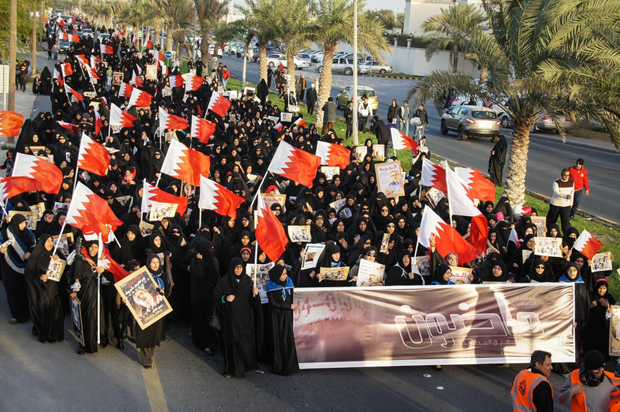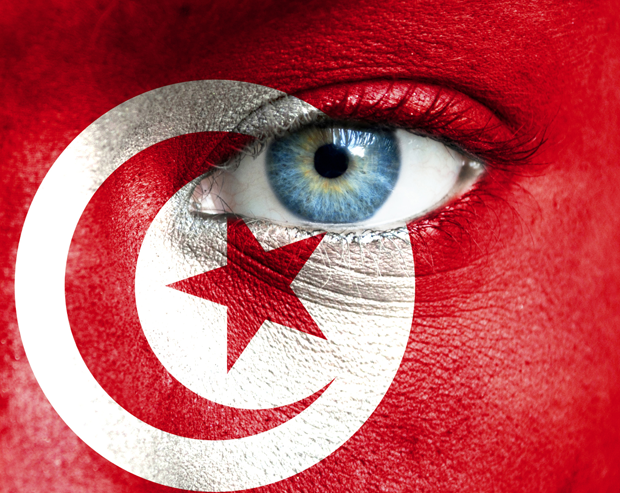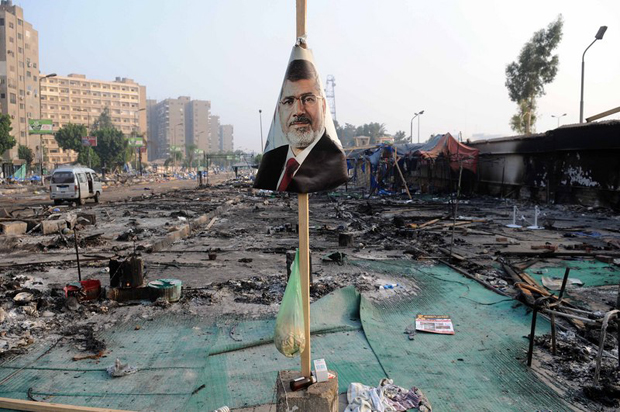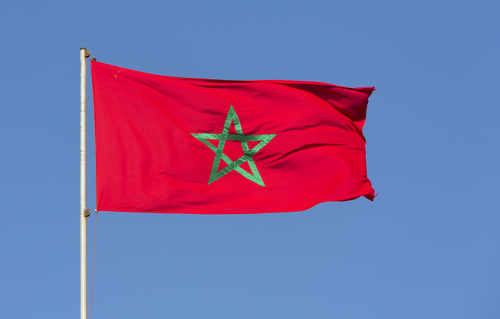21 Jan 2014 | Middle East and North Africa, News

A pro-democracy protest in Bahrain, where activists have been jailed for inciting protests through their online activities (Photo: Moh’d Saeed / Demotix)
One hundred and forty characters are all it takes.
Twitter users from Marrakech to Manama know—call for political reforms, joke about a sensitive topic, or expose government abuse and you could end up in jail. Following the overthrow of Muammar Qaddafi and Zine el-Abidine Ben Ali, authorities in Libya and Tunisia unblocked hundreds of websites and dismantled the state surveillance apparatus. But overall, internet freedom in the region has only declined in the three years since the Arab Spring as authoritarian leaders continue to crack down on any and all threats to their ever-tenuous legitimacy.
As the online world has become a fundamental part of Arab and Iranian societies, leaders are waking up to the “dangers” of social media and placing new restrictions on what can be read or posted online. This shift has been most marked in Bahrain, one of the most digitally-connected countries in the world. After a grassroots opposition group took to the streets to demand democratic reforms, authorities detained dozens of users for Twitter and Facebook posts deemed sympathetic to the cause. Similarly, several prominent activists were jailed on charges of inciting protests, belonging to a terrorist organization, or plotting to overthrow the government through their online activities.
Conditions in Egypt—where social media played a fundamental role in mobilising protesters and documenting police brutality—continued to decline over the past year. In only the first six months of Mohammad Morsi’s term, more citizens were prosecuted for “insulting the office of the president” than under Hosni Mubarak’s entire 30-year reign. Cases have now been brought against the same bloggers and activists that were instrumental in rallying the masses to protest against Mubarak (and later Morsi) in Tahrir Square, while countless others were tortured by Muslim Brotherhood thugs or state security forces.
Even in the moderate kingdoms of Morocco and Jordan, state officials are looking to extend their existing controls over newspapers and TV channels to the sphere of online media. Ali Anouzla, a website editor in Morocco, faces terrorism charges in the latest attempt by the state to silence him and his popular online newspaper, Lakome. Access to independent journalism is even worse in Jordan, where over 200 news sites have been blocked for failing to obtain a press license. The government instituted burdensome requirements in a bid to deter any views that counter the state-sponsored narrative.
If governments are beginning to pay attention, it is because online tools for social mobilisation and individual expression are having a profound impact. Social media accounts were set up for every candidate in Iran’s 2013 presidential elections, despite the fact that Twitter, Facebook, and YouTube are all blocked within the country. In Saudi Arabia – which now boasts the highest Twitter and YouTube usage per capita of any country in the world – social media has been used to promote campaigns for women’s right to drive, to highlight the mistreatment of migrant workers, and to debate sensitive subjects such as child molestation. Citizen journalism was vital in documenting chemical weapons use in Syria, and a new online platform alerts local residents of incoming scud missiles. Nonetheless, Iran, Saudi Arabia, and Syria rank as some of the least free countries in the world in terms of internet freedom according to Freedom House’s Freedom on the Net study.
Remarkably, the country that has made the most positive strides over the past three years, was once among the most repressive online environments in the region – Tunisia. Protest videos from the town of Sidi Bouzid led to an intense crackdown on online dissidents by the Ben Ali regime. Digital activists even enlisted the help of Anonymous, the hacktivist group, to rally international media attention, provide digital security tools, and bring down government websites. Since then, Tunisian authorities have ceased internet censorship, reformed the regulatory environment, and ceded control of the state-owned internet backbone. Tunisia is now the only country in the region to have joined intergovernmental group the Freedom Online Coalition.
So while the snowball effect of social media contributed to the overthrow of several despots, many of the region’s internet users conversely find themselves in more restrictive online environments than in January 2011. Authoritarian governments now know exactly what the face of revolution looks like and, over the past three years, have shown their commitment to counter the internet’s potential to empower citizens and mobilise opposition. Users in liberal democracies may joke about the insignificance of “liking” a post on Facebook or uploading a video to YouTube, but in a region where your social media activity can make you an enemy of the state, 140 characters can lead to serious repercussions.
This article was posted on 21 January 2014 at indexoncensorship.org
15 Jan 2014 | News, Politics and Society, Tunisia

(Photo illustration: Shutterstock)
Tunisia’s National Constituent Assembly (NCA) is voting on a 146-article constitution, following a political crisis which put the country’s democratic transition on hold after the assassination of opposition deputy Mohamed Brahmi last July.
The NCA, where the Islamist Ennahdha Movement enjoys a 40% majority, was elected in October 2011 to draft a new constitution. To be adopted, each article requires a simple majority vote. NCA deputies will then have to approve the text in its entirety by a two-thirds majority.
Articles that guarantee freedom of expression, the rights to access information, protest and assembly, and to form unions, associations and parties were adopted last week. The charter also bans prior censorship on freedoms of thought, conscience, expression and publication (article 30) and enshrines freedom of creation (article 41) and the right to privacy and personal data protection (article 23). Article 48 further states that no future constitutional amendments that violate human rights and freedoms could be introduced to the text.
But, ironically, Tunisia’s self proclaimed progressive and secular opposition stand behind the introduction of an anti-free speech clause in the text. The NCA adopted an amendment to article 6 of the draft constitution banning Takfir (apostasy accusations). Article 6 guarantees freedoms of belief, conscience and religious practice.
On 5 January, the vote on the constitution was interrupted over death threats received by Popular Front deputy Mongi Rahoui. He said he received death threats following declarations made by Habib Ellouze, another NCA representative from Ennahdha. Speaking to the media, Ellouze referred to Rahoui as an “enemy to Islam”. The Interior Ministry confirmed the death threats against Rahoui and placed him under police protection.
“What [Ellouze] said yesterday, that I am an enemy of Islam, has lead to death threats against me”, Rahoui said at the assembly’s plenary session of 5 January. “How much more blood must there be before we understand that we are united”, he added. Rahoui was referring to the assassination of two other fellow Popular Front leaders, Chokri Belaid and Mohamed Brahmi. Belaid, in particular, a staunch critic of Islamists was before his assassination subject to fatwas labelling him as a ‘Kafir’ and an ‘enemy to Islam’ who should be killed.
Following Rahoui’s declaration, NCA deputies from the opposition demanded a revote on article 6 to add a clause ‘banning takfir and incitement to violence’. The clause was approved by 131 votes. But by moving to ban Takfir, Tunisia’s opposition acted out emotionally and without taking into consideration the chilling effect a similar clause could have on free speech. The banning of “apostasy accusations” could only open the door to more restrictions on free speech.
“In just few hours, we will be able to say that the opposition put up in place the first rock in the way of free expression”, Amira Yahyaoui, president of Albawsala, a transparency NGO tracking the NCA’s activities, tweeted before the vote. “How is it nice to watch our representatives unanimously voting in favour of draconian laws”, she added in another tweet.
Following to the opposition’s demands for a constitutional ban on Takfir, Ennahdha’s deputies also called for criminalisation of blasphemy. But, for lack of consensus among the negotiating NCA representatives, the suggestion was not submitted for a vote.
Initially, Tunisia’s Ennahdha did seek to ‘criminalise attacks on sanctities’ in a first draft of the constitution. However, those plans were dropped following negotiations with the other two parties in the ruling coalition. Article 6, still however includes a vague phrase tasking the State with “protecting sanctities” without specifying how, or defining and listing these sanctities.
Meanwhile, Tunisia’s recently established broadcast media regulator, the Independent High Authority for Audiovisual Communication (better known as HAICA) repeatedly expressed its reservations about the draft constitution. HAICA was established by decree 116 on freedom of the media, which was issued on 2 November 2011, to regulate the broadcast media sector.
On a positive move, the constituent assembly incorporated HAICA into the draft constitution. However, the HAICA board criticised provisions in the text threatening the authority’s independence and limiting its prerogatives. Article 122 of the draft constitution states that the Parliament shall elect HAICA’s board members. The media regulator says that this selection process will ‘strip HAICA from its independence’ and make it ‘submissive to the [parliamentary] majority’. Under article 124, HAICA has an ‘advisory’ mission and is not attributed ‘regulatory’ powers which would allow it to regulate and organise the broadcast sector as it is stipulated by decree 116.
The two articles are awaiting NCA’s approval as deputies will first have to discuss and vote on chapters related to the executive branch and the judiciary.
This article was posted on 14 Jan 2014 at indexoncensorship.org
15 Aug 2013 | Comment, Egypt, News

Egypt faced a new phase of uncertainty after the bloodiest day since its Arab Spring began, with nearly 300 people reported killed and thousands injured as police smashed two protest camps of supporters of the deposed Islamist president. (Photo: Nameer Galal / Demotix)
As the numbers steadily mount of those killed by the Egyptian military and police in yesterday’s attacks on Muslim Brotherhood camps, the prospects for Egypt’s ‘Arab spring’ are looking bleak.
The violent destruction of the two camps, and the indiscriminate shootings, beatings and arrests of supporters of ousted President Mohamed Morsi, and of journalists, was clearly planned. The country’s military rulers have taken little time to demonstrate their contempt for the many Egyptians who wrongly thought the army could usher in a more pluralist rights-respecting democracy. The hopes of those who saw July’s coup as somehow too positive to warrant such a label now lie in tatters, with Mohamed ElBaradei’s inevitable resignation just one small illustration of that.
Is this simply a return to square one – back to a Mubarak-style, military-run Egypt? At one level surely it is, with army head General al-Sisi showing neither shame nor compunction in such a murderous installation of the new state of emergency.
But while the similarities to the Mubarak era are clear, this is a new and different Egypt. The millions who demonstrated in Tahrir Square in 2011, and again this June in protest at President Morsi’s authoritarian approach to government, are not simply going to accede to corrupt and vicious military rule once more. And the brutal violence against the Muslim Brotherhood protesters is most likely to beget more violence rather than the destruction of the Brotherhood that the army appears intent on.
With the violent face of the new Egyptian regime now clearly on display to the whole world, with no respect for rights of protesters, or media, or ordinary citizens, the international response has been shamefully muted. The EU’s foreign policy supremo, Cathy Ashton, called for the military to exercise the “utmost restraint” and for an end to the state of emergency “as soon as possible, to allow the resumption of normal life”. Meanwhile Samantha Power, Obama’s UN ambassador, tweeted weakly that the “forcible removal” of protesters was “a major step backward”.
Earlier in the week, the US and EU failed in their mediation attempts to stop the attacks on the camps, that all could see were coming. The key question now should be whether they are prepared to go for tougher diplomacy in an attempt to exert some leverage on the disastrous social and political dynamics that have now been unleashed so far. This would have to revolve around suspension of the $1.3 billion of military aid the US gives Egypt each year.
Obama’s first statement of condemnation finally came today but with no hint of the sort of leadership or signal that suspension of aid would send. Obama’s cancellation of military exercises next month will not worry Egypt’s generals much. And his uplifting speech on a new beginning at Cairo University in 2009 – and his Nobel Prize that year – are surely now lost in the dust and ashes of the aftermath of Wednesday’s violence and the US’s refusal to use the tools of influence it has. For now, more urgent and serious statements are coming rather from the UN.
Whether Egypt’s citizens who demonstrated for an end to military rule, and for a genuine pluralist democracy can regroup enough to have the influence to stop the downward spiral looks doubtful. But the spirit of Tahrir Square did not die yesterday. And if Egypt is now in winter, then spring at some point must come again. But for now the winter looks to be just beginning.
This article was originally published on 15 Aug 2013 at indexoncensorship.org. Index on Censorship: The voice of free expression.
9 Jul 2013 | Middle East and North Africa
Despite promising reform and introducing a new constitution in 2011, Morocco’s treatment of dissidents indicates the changes were just window dressing, Samia Errazzouki writes
Morocco’s King Mohammed VI announced a constitutional reform process during a 9 March 2011 speech, following popular protests organised by the 20 February Movement. Regime supporters and allies — France and the United States — hailed the move towards reform as “unprecedented.” Morocco was soon referred to as the “model for the region.”
But the government’s repression of freedom of expression has remained steadfast even after the new constitution.
Most recently, in March 2013 dissident rapperMouad Belghouat (alias El Haqed) was released from jail after he served his second, year-long prison sentence over his anti-regime lyrics, which were described as “undermining state authority.”
 In February 2012, 18-year old Walid Bahomane was charged with “defaming Morocco’s sacred values” after he posted a caricature of Mohammed VI on Facebook. Even though he did not create the illustration, Bahomane was convicted and sentenced to one year in prison for the act of sharing the image.
In February 2012, 18-year old Walid Bahomane was charged with “defaming Morocco’s sacred values” after he posted a caricature of Mohammed VI on Facebook. Even though he did not create the illustration, Bahomane was convicted and sentenced to one year in prison for the act of sharing the image.
In the same month, Abdessamad Hidour, an activist with the 20 February Movement faced similar charges after a video of him criticising Mohammed VI was uploaded on Youtube. In the video, he likened Mohammed VI’s reign to colonialism and railed against his corrupt practices, landing him a three-year prison sentence.
These are only a few cases out of many that have drawn widespread attention over the nature of the charges as well as the expedited trials that landed all those charged in jail.
Morocco’s latest constitution supposedly grants the right to freedom of expression, but it still leaves room for repression.
The king stacked the constitutional reform deck by appointing the committee to undertake the work. The reforms introduced some liberalisation, but did not address demands for democratisation of the system. It’s an old trick dating to the 1960s when Morocco’s first constitution was drafted following its independence from France.
The latest version of the constitution incorporates human rights language and places greater attention on the legal protection of free speech, such as the following:
- Article 10 grants the opposition the “freedom of opinion, expression, and of assembly.”
- Article 25 states that “The freedoms of thought, of opinion and of expression under all their forms are guaranteed.”
- Article 28 addresses the press, “The freedom of the press is guaranteed and may not be limited by any form of prior censure.”
Out of context, these articles stand as testaments for what regime supporters describe as “landmark reforms.” However in scrutiny and in practice, these articles have proved to be futile. In Article 28, for example, immediately after stipulating the guarantee of freedom of the press, there is a caveat that leaves this article open to interpretation: “All have the right to express and to disseminate freely and within the sole limits expressly provided by the law, information, ideas, and opinion.” Immediately, “freedom of the press” is limited to a legal framework dictated by the regime and this interpretation has come into play in various recent trials where freedom of speech and press has been threatened, especially in instances when the monarchy has been the target of criticism.
The regime’s response to free speech cases following constitutional reform is swift and relatively consistent, indicating no clear break from its past policies. Despite these violations of freedom of expression, Moroccans continue to express their dissent in multiple media, from online publications to protests on the streets, indicating that the regime’s alleged “path toward reforming” is long and winding.
Samia Errazzouki is a Moroccan-American writer and co-editor of Jadaliyya’s Maghreb Page.




 In February 2012, 18-year old
In February 2012, 18-year old